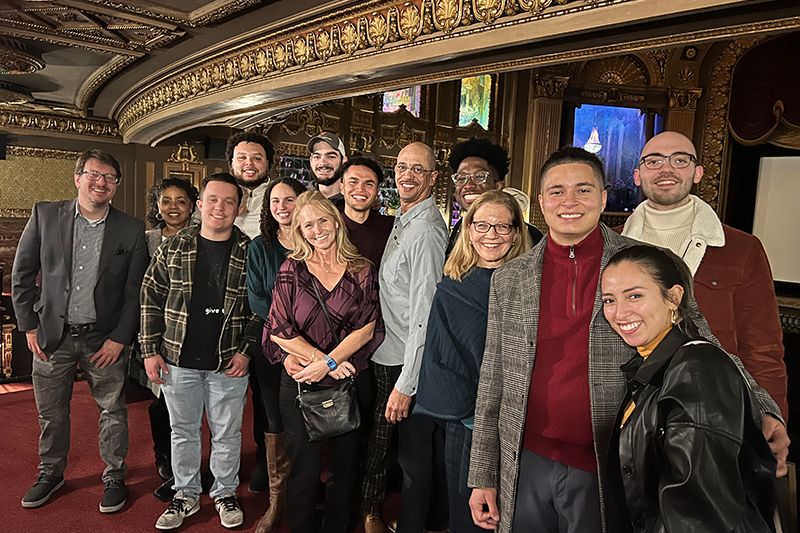
Read time:
An environmental documentary produced by a Christopher Newport alumni has won the top honor at the Richmond Environmental Film Festival.
“Coal Blooded” started out as a sustainability assignment for Brandon Davis, ‘22, marketing during the spring of his senior year. Davis was enrolled in Dr. Linda Manning’s Communication and Film class, and was asked to make a short film about a sustainability issue impacting Christopher Newport or the surrounding region.
What Davis ended up creating was a six-minute award-winning documentary that changed his perspective and convinced him to continue down the filmmaking path.
“When I got the call that "Coal Blooded" won first place, I was entirely blown away!” he said
His professor was less surprised. Dr. Manning said the first time she viewed the film, she knew it was something special and would resonate with the community, environmentalists and the film world.
“I thought it was amazing. It far exceeded my expectations. It looked like a professional film,” she said. “I was thrilled and excited when I heard that Brandon won. I’m pretty sure I whooped into the phone when he called me.”
The short film delves into the history of the coal terminal and the health and environmental hazards it leaves in its wake. Davis said he learned about the terminal during his freshman year as a Bonner Service Scholar. The coal terminal is seven miles from Christopher Newport.
“I knew it was a good project because most of my class hadn’t even heard of it,” he said.
It took Davis and his friend and fellow alum Michael Bush, '22, who assisted, three months to craft “Coal Blooded.” Davis spent much of that time conducting and editing interviews. He spoke with former Newport News Mayor Dr. McKinley Price, several Newport News residents, and Christopher Newport Associate Professor Dr. Johnny Finn, who studies the history of racial segregation in American cities and is also chair of the Department of Sociology, Social Work and Anthropology. Finn provided Davis with geographical insight for the film.
“I’m thrilled that ‘Coal Blooded’ has won the top prize,” Finn said. “This documentary short shines a critical light on one of the most pressing environmental justice issues in the region: the Newport News Coal Terminal. The coal lies immediately adjacent to one of the poorest, high proportion non-white communities on the Peninsula. The film illustrates the profoundly unequal environmental and health impacts the coal has on the surrounding population. Importantly, in addition to focusing our attention on environmental racism in Virginia, this film also features the faces and voices of people who are fighting for a more environmentally just future.”
The film documents the adverse effect the coal and the dust it generates was having on residents of the East End. Further study found that childhood asthma rates near the coal terminal are higher than other areas of the city.
“I was surprised by what I learned. Everything that may shock the viewer when they watch the film shocked me too,” Davis said. “However, for me it was learning from the sources and hearing such depth about the topic from so many different people. I was blown away by the efforts that have already been taken about the century-long impacts on real people, how many toxic sites inhabit the southeast Newport News community, and so much more.”
The coal terminal has been a fixture of Newport News for years. The coal is used in steel making and to generate power for companies that lease space for the coal at the terminal. Davis said that while the film won’t solve the problem, it will hopefully increase awareness and prompt more action.
“I recognized early on that a 6-minute documentary short will not solve this problem, but I hope it teaches and emotionally connects people to the issue and people who live here,” he said. “I hope it helps people to see Newport News in a new light and inspires others to find stories that have never been told.”
When Davis embarked on the project, he did not envision that it would be a game changer. But it was. What he discovered about the 200-acre coal terminal, which houses 1.7 million tons of the black rock, in the city’s East End shocked him. And it has inspired him and others to delve deeper into environmental issues and to continue his passion for making Newport News a healthier and better place to live for all residents.
The film festival judges lauded Davis for the depth of his film and the way it addressed underlying racial issues.
“Using the coal transfer station was a unique way to talk about racial redlining and environmental justice. I enjoyed hearing from diverse community voices and different perspectives,” one of the judges said. “I liked the discussion and consideration of the post-coal fate of the property.”
Another judge said, “I was impressed by the sharp photography, the variety of photographic vantage points: aerials and drone footage, close-ups, and interviews. The images of the waterfront coal facility are both amazing and shocking.”
While making the film, Davis realized just how much he enjoyed the process, and it, in turn, solidified his love of filmmaking.
“I always knew I wanted to make videos, but this film really showed me what I’m capable of and sparked my interest in documentaries,” he said.
Shortly after graduating from Christopher Newport, Davis moved to Florida and was hired as a full-time videographer for Lead Start, a leadership consulting company.
“It allows me to hone my skills and even do some traveling,” he said. “I plan to continue making videos for as long as I can. I want to use my creative passion to travel the world, and tell lots of stories along the way.”